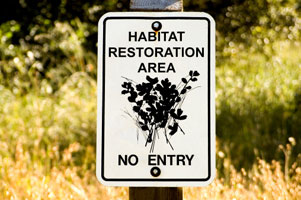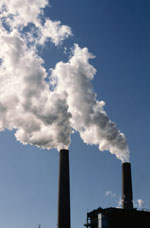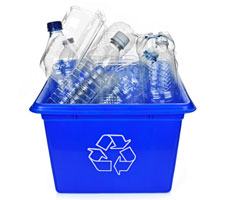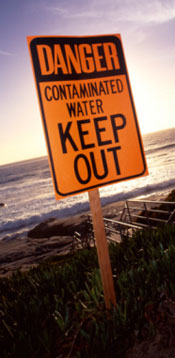The Good News!
You can help reduce negative effects to the Earth.
Goal:
Goal:
So far, it may seem like you’ve seen nothing but a whole lot of bad news about humans and the environment--but that’s not the whole story! As we learn more about the negative effects our activities have on the planet, we come up with new ways to help reduce negative effects. Click the slides to learn more.
|
Protecting Habitats Protecting biodiversity is an important part of keeping the Earth healthy. Scientists around the world are busy identifying species and their habitat requirements. Governments can then set aside land and create laws to protect species that are threatened and endangered. They can also help protect "biodiversity hotspots," where a lot of unique organisms are found together. Many groups also exist to help spread awareness about habitat destruction, endangered species, and other environmental problems. For example, the World Wildlife Fund and Conservation International are two of the many groups that dedicate themselves to protecting habitats and endangered species.
Officials from countries all over the world get together to come up with solutions to environmental problems. They create partnerships and laws that can help reduce air pollution and activities that could lead to global warming. Governments can also limit the types of pollutants some industries spew into the air. They can charge companies that break the rules and encourage them to use technology that reduces air pollution. Governments can also require that car makers create more fuel-efficient cars. They also motivate builders to build more energy-efficient homes. Reducing Land Pollution Cities can fine individuals and businesses that produce too much waste or dispose of it illegally. In addition, many cities offer recycling programs. By giving people a large bin in which they can put things that can be recycled and a small bin in which they put things that can't be recycled, they encourage citizens to reduce the amount of waste they produce. Other cities have large recycling centers where people can drop off recyclable products.
Scientists carefully monitor water sources to make sure they are safe. When they aren't safe, they look for the sources of the problems. They can fine businesses that are polluting water. They can educate people about things we do that pollute water sources. Many cities have set up hazardous waste collection centers. People can bring unwanted paint, oil, and other chemicals to these centers so that the materials don't end up getting poured down the drain and flowing into water resources.
Many cities are requiring that stores sell reusable cloth bags to encourage people not to use disposable paper or plastic bags. Some stores are choosing to get rid of bags altogether, so that their customers have to bring their own reusable bags to carry away the items they buy. Stores today often have "bulk" sections, where families can buy large quantities of flour, peanut butter, and other things they use a lot. Replacing Nonrenewable Resources People are getting more and more interested in alternative sources of energy. You may have seen wind turbines pop up in your area. Perhaps some people have put solar panels on their rooftops. Smaller cars and hybrid vehicles are becoming more popular. Many governments will give home and business owners cash back for trying these new technologies.
|

 Helping the Atmosphere
Helping the Atmosphere
 Reducing Water Pollution
Reducing Water Pollution Reducing Stuff
Reducing Stuff